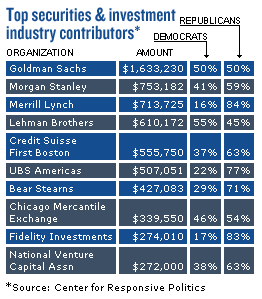NEW YORK (CNN/Money) -
History shows the stock market does better under Democrats.
A recent study from the University of California at Los Angeles, published in the October issue of the Journal of Finance shows that between 1927 and 1998, a broad index of stocks (similar to the S&P 500) returned approximately 11 percent more a year under a Democratic president versus safer, three-month Treasurys. By comparison, the same index only returned 2 percent more a year versus the T-bills under Republicans.

But all the statistics in the world don't mean much to the investors who believe that Democrats aren't as good for business or Wall Street as Republicans. For those investors, Republican President George Bush's re-election this year is the best thing for the market, particularly with the Republican-dominated Congress to contend with.
To that end, according to the Center for Responsive Politics, Wall Street firms have contributed $3.9 million to Bush’s re-election campaign. John Kerry, Wall Street's favorite Democratic candidate in terms of campaign contributions and the winner of the Iowa caucuses Monday, has received slightly more than a quarter of that.
Now, with the New Hampshire primary just around the corner, it's worth looking again at how the top Democratic contenders are perceived on the Street and who is seen as the most market friendly.
Assessing the Democratic candidates' potential impact on the stock market during the primaries is difficult, said Leslie Alperstein, political economist and president of Washington Analysis, an independent research firm that used to be connected to investment bank HSBC.

At this time, hardly any of them has a detailed plan on the economy, the budget deficit or taxes, he said. What's more, candidates from either party tend to shift their platforms closer to the center once the primaries are over and they need to appeal to a broader vote.
A January Money magazine poll of the so-called "investor class" showed that roughly half of those surveyed would vote for Bush. Of the Democrats, the order of preference was Howard Dean, Wesley Clark, John Kerry, Joe Lieberman and Richard Gephardt.
After finishing fourth in the polls in Iowa, Gephardt dropped out of the race later Tuesday.
John Edwards did not rank in the top five in the Money survey, but he is one of the top democratic candidates whose campaign the securities industry has contributed to and he finished a close second in the Iowa caucus.
Here's a look at what Wall Street perceives to be the pros and cons of the top candidates.
John Kerry
"The market never met a tax cut it didn't like and it would not be happy with a complete roll back," said Barry Ritholtz, market strategist at Maxim Group, "but if the economic recovery seems to be full-throated, the market might be willing to accept the rolling back of select tax cuts as a means of reducing the deficit, making John Edwards and John Kerry more appealing."
Pros:
- Does not support repeal of all of Bush's tax cuts.
- Wants to give a tax credit to companies that create U.S. manufacturing jobs.
Cons:
- Wants to close tax loopholes for companies that move jobs overseas.
- Wants to set a cap on executive pay.
John Edwards
Pros:
- Does not support repeal of all of Bush's tax cuts, and would create new tax cuts for the middle class.
- Would give corporations a 10 percent tax credit for keeping jobs in the United States.
Cons:
- Would require expensing of stock options
- Wants to pass a "CEO Right to Know" law that would require corporations to tell shareholders how much CEO's earn.
- Would stop companies from using international tax shelters.
Howard Dean
"Dean probably scares the market the most because he, for now at least, is calling for rolling back all of the tax cuts," said Alperstein.
Pros:
- Dean has a first-hand understanding of financial markets. He was a stockbroker and an analyst before moving into medicine, and beyond that, quadrupled a $1 million gift from his parents over 20 years of investing in stocks, bonds and mutual funds.
Cons:
- Supports outright repeal of Bush Administration's tax cuts.
- Says the federal government has worked for the benefit of large corporations for too long and wants to switch the focus to empowering small business.
Says corporations need to be responsible for more in taxes, and would set up harsher penalties for companies that use foreign tax shelters to avoid paying U.S. taxes and use other tax loopholes
Wesley Clark
"All of the top candidates have said that they want to repeal some or all of the Bush tax cuts, but Clark at least has a specific plan," said Don Luskin, chief investment officer at Trend Macrolytics.
Pros:
- After a life long military career, he returned to the private sector in 2000 and worked as an investment banker in his home state of Arkansas for three years, before declaring his candidacy for president.
- He does not advocate repealing all of Bush Administration's tax cuts.
Cons:
- Wants to close corporate tax loopholes and increase the tax rate on wealthiest Americans.
Joseph Lieberman
"I would say Joe Lieberman (would be perceived as being the most pro-business)," said Thomas Mann, a senior fellow at the Brookings Institution. But he also noted that Lieberman "is the least likely of the major candidates to win the nomination."
Pros:
- He's a long-time centrist and is seen as being not as "pro-regulatory" as other candidates.
- He supports sustaining some of Bush tax cuts for the middle class.
- He has backed the Bush administration as a Senator on some of the more "pro-business" issues brought before Congress in the last three years.
Cons:
- Lieberman believes in raising the tax rate for the top income earners.

|